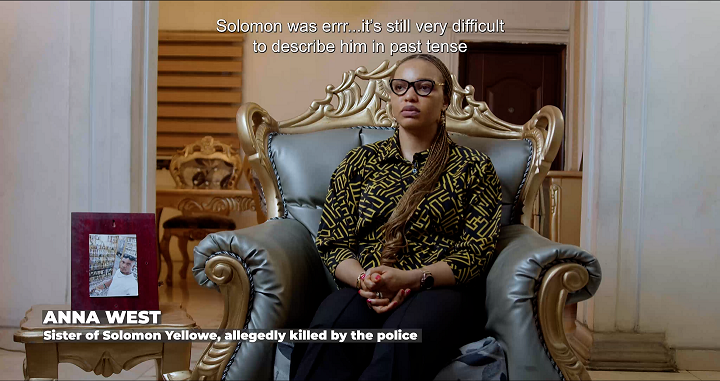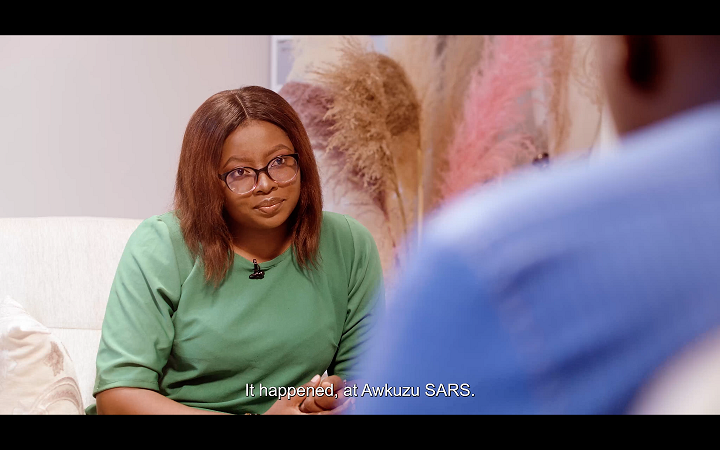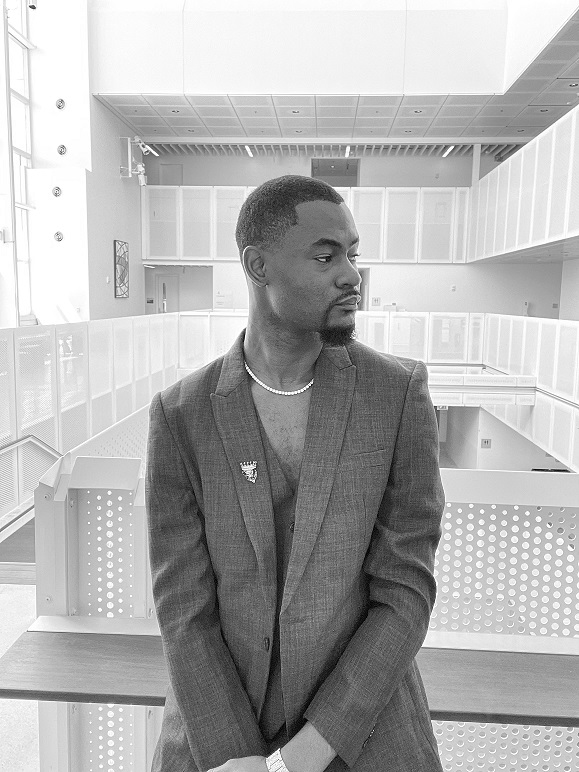Two years ago, in October, hundreds of thousands of young Nigerians occupied the streets in cities and towns, marching tireless under the sun. From Lagos in the west and Abuja in the north to Enugu in the east and Port Harcourt in the south, they marched in multitude, ethnic and religious identities giving way to one, uncomplicated message: Stop killing us, stop harassing us, End SARS. Their message was for President Muhammadu Buhari, the former military head of state whose civilian administration had the power to stop the random murders of young Nigerians by the rogue police unit called SARS: the Special Anti-Robbery Squad. The End SARS protests was a moment that a generation found its voice, taking it from Twitter to the streets, and documenting their stories and resistance on social media and websites.
“I killed your son and there’s nothing you can do about it”
One of the many viral stories was by a young woman named Obianuju Iloanya. She detailed how, eight years before, in 2012, when she was 17, her brother, Chijioke, was arrested by SARS; their family traveled to the SARS base in Awkuzu where they saw him but were not allowed to reach him; when they returned, the head officer told them, “I have killed your son and there’s nothing you can do about it.”
The SARS officer who made this comment, Obianuju said, was called James Nwafor. The moment she named him as her brother’s killer, many more people began to share their stories of the man, reputed to be reckless with human lives, a Chief Superintendent of Police said to have overseen the dumping of dead bodies in Ezu River in 2013, bodies believed to be victims of Awkuzu SARS. CSP James Nwafor became one of the faces of the murders of unarmed young Nigerians.
End SARS ended on a fatal note, on October 20, 2020, with the Lekki Massacre, where the Nigerian military opened fire on unarmed protesters, and later denied it, despite video evidence. The government, meanwhile, made a show of listening, convening panels across the country to hear survivors of SARS and families of victims, and to recommend terms of justice. Out of the estimated over 100 hearings at the Anambra State panel, a reported 90 indicted CSP Nwafor, but, as the man had told the families beforehand, nothing happened to him.
The stories of the families of four young men murdered by SARS officials form the core of Awaiting Trail, a new documentary by the media entrepreneur and journalist Chude Jideonwo. In addition to Chijioke Ilodianya’s family, we hear Anna West, sister of Solomon Yellowe, who was abducted by SARS in the Port Harcourt district of Rukpokwu and likely murdered with gas; the family of Okwuchukwu; and the parents of Jimoh Isiaq, the first victim of the End SARS protests, who was merely standing by the roadside in Ogbomoso, Oyo State, observing a faraway military commotion when a bullet struck him. Also interviewed are a few influential figures during the protests, including the musician and actor Falz, the comedian Mr. Macaroni, the activist Rinu Oduala, and the Nigerian Bar Association (NBA) president Olumide Akpata.
The first film from Jideonwo’s new studio, Chude Jideonwo Presents, Awaiting Trial opened for a free 5-day screening on YouTube on October 20, the second anniversary of the Lekki Massacre. By the fourth day, when I saw it, over 100,000 people had as well. On Instagram, the novelist Chimamanda Ngozi Adichie wrote captured the feeling of many people:
We know the rot is deep, we know the soul of Nigeria is at stake, and yet to see it so starkly presented, to hear from families destroyed by an inhumane and incompetent Nigerian state, feels newly devastating.

“It’s like opening the wound daily”
In the days leading up to Lekki, as the protests gained ground, Jideonwo, host of the talk show WithChude, first wrote about it, and then started an interview series with survivors of SARS. “But it still didn’t feel enough,” he told me. “I had always wanted to make a film about the Awaiting Trial crisis, and then the more I spent time thinking about the emotional milestone for our country that #EndSARS was, the more it became apparent to me that both were inextricably linked. The more I felt through it, the more I knew someone had to tell this story; a deliberate telling of the emotional consequences of the death and damage that both #EndSARS and our culture of police brutality deal on all of us.”
He first knew Obianuju after watching a video of her telling her brother’s story one night during the protest. Her “haunting” voice stayed him. He reached out to the journalist Chika Oduah, who linked him with Obianuju, with whom he had a two-hour sit-down, and from there began to map the story, to identify people willing to share theirs.
Obianuju Ilodianya is a resonant presence onscreen, and proves a powerful advocate for her murdered brother. She shares that the Anambra State panel made difficult demands of the grieving families, requiring that they make several copies of their petition. “I went to the police station where my brother was killed,” she says, to deliver a copy.
She shares that CSP Nwafor refused to come to the panel; that the police legal rep, Barr. Innocent Obi, claimed that her brother was a robber and took the police to his robbery gang, who opened fire on the police and her brother died in the crossfire. But Obianuju is also smart: she points out that a shootout between a robbery gang and the police in January 2013—the month of Chijioke’s murder—would have been in the papers, but there is no such record. She notes that the panel held hearings in November 2020; two years later, it still has no recommendation. “I think it’s a deliberate act to let James Nwafor go scot-free,” she says.
Her parents are still wrecked, visibly, by their son’s disappearance. “Everyday somebody will come and ask you questions and you’ll start again,” Mrs. Iloanya says. “After recounting what happened, how it happened, how they treated you, that person will go. They don’t know how we feel inside. So when you get inside the room, you start to weep, you start to ask yourself questions. It’s like opening the wound daily.” Her words are rending. Later, she says, “Nigeria di egwu”—Igbo for a range of meanings; in this context, the terrifying perplexity of Nigeria.
But not all mothers are available to speak for their sons. Okwuchukwu’s mother died of stroke, still breathing his name in her final days. And not all sisters were spared the horror of discovery meted out to Anna West, whose brother, Solomon Yellowe, a student at the University of Port Harcourt, had gone to sit for a test and was taken in by a SARS officer named Samuel Sunday. The Yellowe family would not learn what happened to their son until a chance encounter: his girlfriend accompanied a friend to a prison and wrote her boyfriend’s name; an inmate impersonated her brother so he could meet her and tell her that SARS murdered him months ago. That moment, scored hauntingly, is one of the documentary’s most powerful.

And yet the more horrific the stories become, they more horrific they become. A woman, off camera, says she was forced to sleep with SARS men, to get them to free her brother. Afterwards, they told her they’d killed him. It is a trail I hoped the documentary would follow, but Jideonwo told me he could not have. “It was completely unplanned, and, right up to release, I struggled with telling that story,” he said. “But she wanted her story to be told. We had a conversation about potential consequences, but she wanted this to be told. For some reason, she felt she could trust us finally with it. She had carried this too long inside herself; as she heard me talk to the other two ladies, she suddenly—unplanned—poured forth and said her voice needed to be heard.”
Still, the production team treated that information with extra sensitivity. “I was relieved when she watched it afterwards and was very grateful for it,” Jideonwo said. “I made a decision that what she shared was enough, and the way she shared—the rawness and immediacy and sheer personal power of it—was enough.”
“He’s not afraid of any fucking human being”
When Jideonwo arrived Anambra State to tell the families’ stories, he also hoped to hear from CSP James Nwafor himself. Predictably, the man did not respond to interview requests. A contractor, speaking off camera, said it would not have mattered anyway. “When you look into it, Nwafor may not have graduated police college,” the man says Jideonwo. “He’s not afraid of any fucking human being. I’m not saying that Nwafor will resist arrest. He will go. But if there’s no strong hand, to judge the case and to give justice to this case, my brother, Nwafor will come back oh. He will even come back with a flying colour, maybe they will carry Hilux and bring him back.”
Jideonwo’s narration does well to provide cultural context for the pending justice for End SARS victims, including the Nigerian legal limbo called “awaiting trial,” from where the documentary took its name. That culture—of being arrested, sometimes for the flimsiest reasons, and spending months and years in jail without getting a hearing—is fed, he explains, by a long chain of subcultures: many Nigerians have a stigma of being arrested, which leads to their eagerness to bribe police to avoid it, which leads to the police getting greedier, becoming emboldened to impunity, which leads right back to the police making random, baseless arrests.
After contacting and speaking with Obianuju Iloanya, Jideonwo began conversations with Headfort Foundation, a group fighting for inmates awaiting trial and highlighting corrupt lawyers working for police and stealing from clients. In an unnerving scene, a former inmate describes Nigerian prisons as “dustbin.”
I asked Jideonwo if he is worried about political retaliation, and he admitted that there are concerns about the safety of his team, but, more than that, they are concerned for those who told their stories — something they discussed with the families.
Awaiting Trial is a documentation of defiance. Obianuju Iloanya says that she will continue to seek justice for her brother Chijioke, against mounting odds. What, for Jideonwo, is the ultimate hope for justice, now that the stories of the murdered men and their traumatized families are out in the world in this new context?
“My job is to tell the story as best as I can, and then to offer it to the universe and let Reality take its course,” he said. “I am very clear about my role. Not in a macro sense, but for me as person, what role I want to play as a storyteller in this third act of my life. And in that space, my job is only to be a vessel for other people’s stories. People asked me as I worked on this, What is the purpose of it? What’s the vision now? Do we raise a fund? Do we build a coalition of NGOs? My answer was, Let’s tell the story. Let’s trust the story.” ♦
Correction (July 17, 2023): A previous version of this story wrongly stated Chijioke and Obianuju Iloanya’s last name to be “Ilodianya.”
If you love what you just read, please consider making a PayPal donation to enable us to publish more like it.





